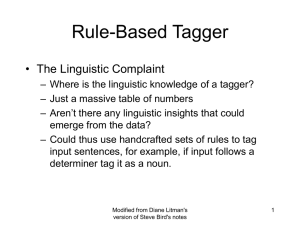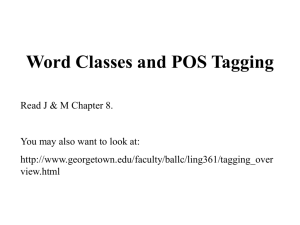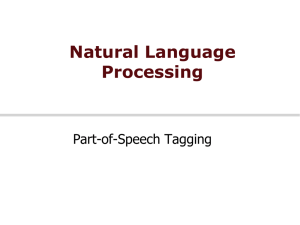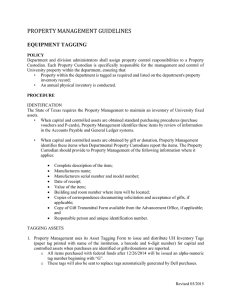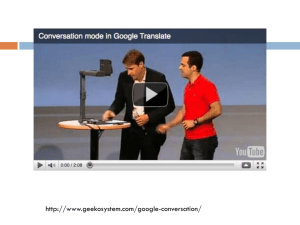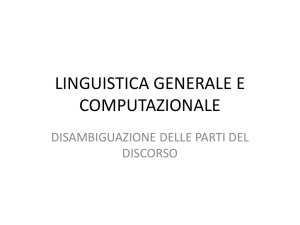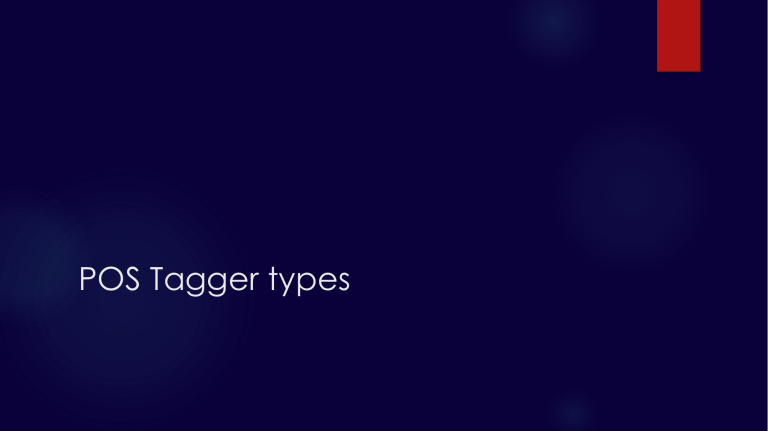
POS Tagger types
History of Tagging
History of Tagging
Why POS Tagging
Why POS Tagging
❖Named Entity Recognition (NER)
❖Sentiment analysis
❖Question answering
❖Word sense disambiguation.
POS Tagging
POS Tagging
❖Words have more than 1 POS
❖The back door = JJ
❖On my back = NN
❖Win the waters back = RB
❖Promised to back the bill = VB
❖What is POS tagging problem?
❖To determine the POS tag for a particular instance of a word
How hard is POS tagging?
Methods of POS Tagging
❖Rule Based
▪ ENGTWOL
❖Stochastic
▪ HMM, CRF
❖N-gram tagging
❖Transformation Based Tagging
▪ Brill Tagger
POS Tagging using HMM
▪ The collection of tags used for a particular task is known as a tagset.
▪ The POS tagging in this project is using a universal tagset.
▪ They are total 12 tags in this tagset
POS Tagging using HMM
POS Tagging using HMM
POS Tagging using HMM
Incorrect POS Tagging using MFC
POS Tagging using HMM
POS Tagging using HMM
POS Tagging using HMM
❖HMMM tagger has 1 hidden state for each possible tag
❖And 2 distributions
❖Emission probabilities and Transition probabilities
❖Emission probability – probability of observing a given word
❖Transition probabilities give the conditional probability of moving
between tags
❖HMM uses Maximum likelihood estimate
❖To find POS for sentence
❖Jane will spot Will
POS Tagging using HMM
OUTPUT - POS Tagging using HMM
Rule Based Tagging
❖Start with a dictionary
❖Assign all possible tags to words from dictionary
❖Write rules by hand to selectively remove tags
❖Leaving the correct tag for each word
Start with a dictionary
Assign every possible tag
Write rules to eliminate tags
Write rules to eliminate tags
Write rules to eliminate tags
N-Gram Tagger
❖Unigram tagger use 1 item or context, consider 1 token
❖This tagging is based on training data – memorized data
❖Useless for new text
❖Tag for “wind” will be same irrespective of context “the wind” or “to wind”
N-Gram Tagger
❖N-Gram tagger is generalized unigram tagger
❖Context is current word and POS tag of n-1 preceding tokens
❖When n=3, we consider tags of 2 previous words
❖N-gram tagger picks the tag most likely in the given context
❖As n increases, sparse data problem increases
Default Tagger
❖Simplest tagger
❖Assigns same tag to each word
❖default_tagger = nltk.DefaultTagger('NN')
❖default_tagger.tag(tokens) [('I', 'NN'), ('do', 'NN'), ('not', 'NN'), ('like', 'NN'),
('green', 'NN'), ('eggs', 'NN'), ('and', 'NN'), ('ham', 'NN'), (',', 'NN'), ('I', 'NN'), ('do',
'NN'), ('not', 'NN'), ('like', 'NN'), ('them', 'NN'), ('Sam', 'NN'), ('I', 'NN'), ('am', 'NN'),
('!', 'NN’)]
❖Establishes a baseline
Regular Expression Tagger
❖Assign tag to token on basis of matching pattern
❖Any word ending in ed is the past participle of a verb
❖Any word ending with ’s is a possessive noun
❖>>> patterns = [
❖... (r'.*ing$', 'VBG'), # gerunds
❖... (r'.*ed$', 'VBD'), # simple past
❖... (r'.*es$', 'VBZ'), # 3rd singular present
❖... (r'.*ould$', 'MD'), # modals
❖... (r'.*\'s$', 'NN$'), # possessive nouns
❖... (r'.*s$', 'NNS'), # plural nouns
❖... (r'^-?[0-9]+(.[0-9]+)?$', 'CD'), # cardinal numbers
❖... (r'.*', 'NN') # nouns (default) ... ]
Lookup Tagger
❖A lot of high-frequency words do not have the NN tag
❖Find the hundred most frequent words and store their most likely tag
❖use this information as the model for a “lookup tagger”
❖what it does on some untagged input text:
❖>>> sent = brown.sents(categories='news')[3] >>>
baseline_tagger.tag(sent) [('``', '``'), ('Only', None), ('a', 'AT'), ('relative',
None), ('handful', None), ('of', 'IN'), ('such', None), ('reports', None), ('was',
'BEDZ'), ('received', None), ("''", "''"), (',', ','), ('the', 'AT'), ('jury', None), ('said',
'VBD'), (',', ','), ('``', '``'), ('considering', None), ('the', 'AT'), ('widespread',
None), ('interest', None), ('in', 'IN'), ('the', 'AT'), ('election', None), (',', ','),
('the', 'AT'), ('number', None), ('of', 'IN'), ('voters', None), ('and', 'CC'), ('the',
'AT'), ('size', None), ('of', 'IN'), ('this', 'DT'), ('city', None), ("''", "''"), ('.', '.')]
Conditional Random Field
❖Probabilistic approach to POS tagging
❖Input in CRF is a set of features
❖Derived using feature function
Features in CRF
❖Is the first letter of the word capitalised (Generally Proper Nouns have the
first letter capitalised)?
❖Is it the first word of the sentence?
❖Is it the last word of the sentence
❖Does the word contain both numbers and alphabets?
❖Does it have a hyphen (generally, adjectives have hyphens - for
example, words like fast-growing, slow-moving)
❖Is the complete word capitalised?
❖Is it a number?
❖What are the first four suffixes and prefixes?(words ending with “ed” are
generally verbs, words ending with “ous” like disastrous are adjectives)
Backoff Tagger
❖Many words in Lookup tagger have been assigned a tag of None
❖Use the lookup table first
❖If it is unable to assign a tag, then use the default tagger
❖This process is known as backoff
Transformation based Tagging
❖Also called Brill tagging
❖Require training corpus
❖Transforms one state to another state by using transformation rules
❖Take inspiration from rule based and stochastic tagging
❖Based on rules it assigns tags to words
❖Rules are automatically learned from data
Transformation based Tagging
❖How does it work?
❖Start with the solution
❖Most beneficial transformation chosen in each cycle
❖Apply to the problem transformation chosen in last step
Replace NN with VB when the previous word is TO
Transformation based Tagging
❖Example
❖The President said he will ask Congress to increase grants to states for
vocational rehabilitation
❖Two rules are
❖Replace NN with VB when the previous word is TO
❖Replace TO with IN when the next tag is NNS
Write rules to eliminate tags
Question
❖I do not like green eggs and ham, I do not like them Sam I am!
❖What will be the output of default tagger?
❖default_tagger = nltk.DefaultTagger('NN')
Answer
❖I do not like green eggs and ham, I do not like them Sam I am!
❖>>> raw = 'I do not like green eggs and ham, I do not like them Sam I
am!'
❖>>> tokens = nltk.word_tokenize(raw)
❖>>> default_tagger = nltk.DefaultTagger('NN')
❖>>> default_tagger.tag(tokens)
❖[('I', 'NN'), ('do', 'NN'), ('not', 'NN'), ('like', 'NN'), ('green', 'NN'),
❖('eggs', 'NN'), ('and', 'NN'), ('ham', 'NN'), (',', 'NN'), ('I', 'NN'),
❖('do', 'NN'), ('not', 'NN'), ('like', 'NN'), ('them', 'NN'), ('Sam', 'NN'),
❖('I', 'NN'), ('am', 'NN'), ('!', 'NN')]
Tagging new words
Tagging new words
Summary
